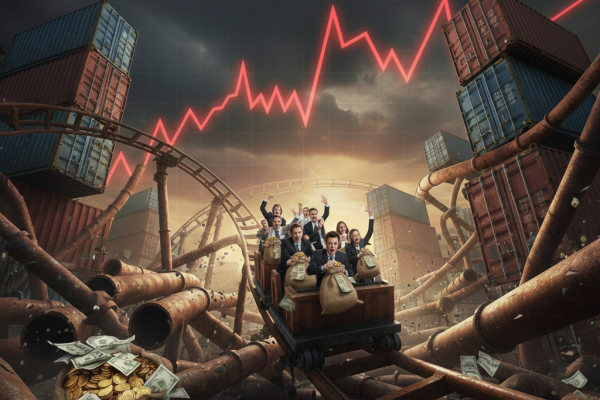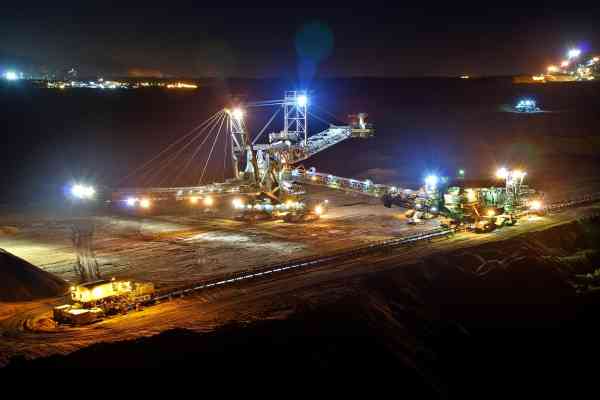September 3rd, 2021 | 11:51 CEST
Deutsche Rohstoff, K+S, Royal Dutch Shell - Where to invest as fund managers cut equity exposure?
A look at the Global Fund Manager Survey conducted by Bank of America shows the views of Fund managers have changed significantly in the past month. Only 27% now expect the global economy to be strong, compared with almost twice as much optimism the previous month. One reason is the expectation that the FED will noticeably turn off its monetary tap at the end of the year. The money glut has sparked inflation, which can be seen clearly in commodity prices. All these are reasons why the cash quota in the funds is being increased, and the equity quota decreased. The high commodity prices are benefiting commodity producers in particular, which is why we are looking at three companies from this sector today.
time to read: 4 minutes
|
Author:
Armin Schulz
ISIN:
DT.ROHSTOFF AG NA O.N. | DE000A0XYG76 , K+S AG NA O.N. | DE000KSAG888 , ROYAL DUTCH SHELL A EO-07 | GB00B03MLX29
Table of contents:

"[...] China's dominance is one of the reasons why we are so heavily involved in the tungsten market. Here, around 85% of production is in Chinese hands. [...]" Dr. Thomas Gutschlag, CEO, Deutsche Rohstoff AG
Author
Armin Schulz
Born in Mönchengladbach, he studied business administration in the Netherlands. In the course of his studies he came into contact with the stock exchange for the first time. He has more than 25 years of experience in stock market business.
Tag cloud
Shares cloud
Deutsche Rohstoff - Strong figures and expansion of oil production
The month of August held plenty of good news for Deutsche Rohstoff investors. The first was the listing of Almonty Industries, in which Deutsche Rohstoff holds 12.2% of the shares, on the Australian stock exchange ASX on August 2. The listing and the associated capital increase pave the way for the largest tungsten mine outside China. It is expected that this will significantly increase the value of the investment.
On August 5, the excellent half-year figures were presented. With sales of EUR 38.8 million, EBITDA of EUR 39.9 million was reported. The main contributors were oil production and income from the investment portfolio, which generated earnings of EUR 36.8 million. Another highlight is the reduction in debt from EUR 92 million at the end of 2020 to EUR 59 million. With the repayment of the bond and a loan in July, debt was reduced by a further EUR 22.8 million.
Then, at the end of August, Bright Rock Energy, a subsidiary of Deutsche Rohstoff, became active in Wyoming and Utah. On August 25, it was announced that it would begin drilling in Wyoming. The investment is approximately USD 9 million, and the first production of oil is scheduled for December. Drilling is already underway in Utah, and as announced on August 30, development is now accelerating. It is expected to produce 1,500 barrels of oil equivalent per day in the first quarter of 2022. The USD 18 million investment should pay for itself within 1-2 years.
In addition to oil and gas, the Company also has interests in tungsten, gold and lithium. The investments made during the Corona Crisis were all positive for the Company's performance. The stock has already been on an upward trend since early 2021. Future investments have been made so that further growth of the Group can be assumed.
K+S - Reduces debt
Potash prices have once again reached record levels. At the beginning of 2021, the price in Brazil was USD 250 and has now reached USD 720 per ton. With such an increase, consolidation will also set in sooner or later. However, this should not affect K+S so strongly. Through the sale of the salt business in the USA, many debts have been paid off. The Group's earnings have also improved significantly due to the high price of raw materials. That means that debts can be reduced even more quickly. As experts expect demand for fertilizers to remain high, the business will also be buoyant for the foreseeable future.
Since August 11, the share price has plummeted from EUR 13.23 to EUR 10.90. At EUR 11, there was a double bottom, which also held. Since August 19, the share has been climbing again. According to Bloomberg, based on the special income from the sale of the salt business, a net profit of EUR 4.96 per share could be achieved. At the current share price of EUR 12.25, this results in a price/earnings ratio (P/E) of 2.5. If the special effect is excluded, a P/E ratio of around 5.2 remains, assuming earnings per share of EUR 2.37. The current valuation is, therefore, favorable. The ratio would look even better if the Group were debt-free.
Royal Dutch Shell - Strengthens sustainability
The oil price has risen significantly this year. Royal Dutch Shell has also benefited from this, but they have had to change their focus to achieve the required climate targets since the Amsterdam ruling. Whether the oil price can remain at this high level remains to be seen. On the one hand, demand has been rising since the Corona pandemic subsided, and on the other hand, OPEC is once again producing more oil. How the Delta mutation will affect demand remains to be seen. As long as there are no more lockdowns, demand should remain stable.
The Group is trying to optimize its carbon footprint through new business units. The subsidiary Sarawak Shell Berhad is developing Timi natural gas project, which will be powered by solar and wind energy. Together with CoensHexicon, a floating wind farm is being built in Korean waters with a capacity of 1.4 gigawatts. In the UK, 50,000 charging stations for electric cars are to be built in the coming years. Existing road infrastructure is to be used for this.
The world will not get along without oil for a long time yet, and the profits will be put into renewable energies and e-mobility. This transformation will take time. The share has been running sideways between EUR 15.50 and EUR 17.80 since the beginning of July. The current dividend yield is about 4.8%. If you are not a dividend hunter, you should wait for the effect of the OPEC production volume increase. In addition, due to Hurricane Ida, the Norco production site is without power.
All commodity suppliers can look back on the year to date with satisfaction. The increase in raw material prices has led to good results almost across the board. Deutsche Rohstoff is very diversified with its oil production, tungsten, gold and lithium. K+S seems to have managed the turnaround from debt, partly thanks to a sharp rise in the potash price. Royal Dutch Shell is in the transformation phase and will remain a significant oil producer in the long term, but is now also increasingly focusing on sustainability.
Conflict of interest
Pursuant to §85 of the German Securities Trading Act (WpHG), we point out that Apaton Finance GmbH as well as partners, authors or employees of Apaton Finance GmbH (hereinafter referred to as "Relevant Persons") may in the future hold shares or other financial instruments of the mentioned companies or will bet on rising or falling on rising or falling prices and therefore a conflict of interest may arise in the future. conflict of interest may arise in the future. The Relevant Persons reserve the shares or other financial instruments of the company at any time (hereinafter referred to as the company at any time (hereinafter referred to as a "Transaction"). "Transaction"). Transactions may under certain circumstances influence the respective price of the shares or other financial instruments of the of the Company.
Furthermore, Apaton Finance GmbH reserves the right to enter into future relationships with the company or with third parties in relation to reports on the company. with regard to reports on the company, which are published within the scope of the Apaton Finance GmbH as well as in the social media, on partner sites or in e-mails, on partner sites or in e-mails. The above references to existing conflicts of interest apply apply to all types and forms of publication used by Apaton Finance GmbH uses for publications on companies.
Risk notice
Apaton Finance GmbH offers editors, agencies and companies the opportunity to publish commentaries, interviews, summaries, news and etc. on news.financial. These contents serve information for readers and does not constitute a call to action or recommendations, neither explicitly nor implicitly. implicitly, they are to be understood as an assurance of possible price be understood. The contents do not replace individual professional investment advice and do not constitute an offer to sell the share(s) offer to sell the share(s) or other financial instrument(s) in question, nor is it an nor an invitation to buy or sell such.
The content is expressly not a financial analysis, but rather financial analysis, but rather journalistic or advertising texts. Readers or users who make investment decisions or carry out transactions on the basis decisions or transactions on the basis of the information provided here act completely at their own risk. There is no contractual relationship between between Apaton Finance GmbH and its readers or the users of its offers. users of its offers, as our information only refers to the company and not to the company, but not to the investment decision of the reader or user. or user.
The acquisition of financial instruments entails high risks that can lead to the total loss of the capital invested. The information published by Apaton Finance GmbH and its authors are based on careful research on careful research, nevertheless no liability for financial losses financial losses or a content guarantee for topicality, correctness, adequacy and completeness of the contents offered here. contents offered here. Please also note our Terms of use.




